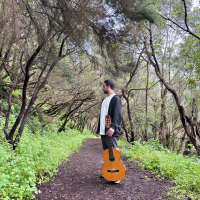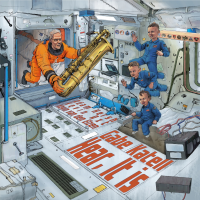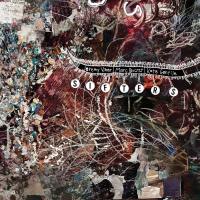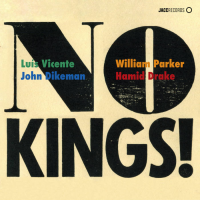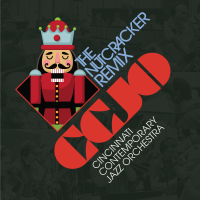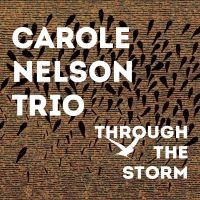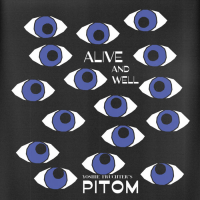Home » Jazz Articles » Extended Analysis » John Scofield: John Scofield: Country for Old Men
John Scofield: John Scofield: Country for Old Men
Scofield may be approaching the midpoint of his seventh decade on earth, but maintains an active touring schedule and a pretty reasonable certainty that fans can expect at least one new album every year. Still, beyond culling its material from genre that many jazz fans hate with a vengeance, that the guitarist is releasing another jazz album back-to-back with the 2016 Grammy Award-winning reunion with saxophonist Joe Lovano on his superb Impulse! Records debut, Past Present (2015)—which turned into one of the 2016 TD Ottawa Jazz Festival's most memorable performances. It breaks a long streak of alternating between jam band records like 2013's Überjam Deux (EmArcy, 2013) and concept albums like his Ray Charles tribute and the blues/New Orleans-informed Piety Street (EmArcy, 2009), with more decidedly jazz-oriented albums including his collaboration with composer/arranger Vince Mendoza and the Metropole Orkest, 54 (EmArcy, 2010) and smaller but no-less ambitious albums like the particularly exceptional This Meets That (EmArcy, 2007) and EnRoute (Verve, 2004).
Still, at this point in his life and career, Scofield can pretty much do as he pleases and, not unlike This Meets That—which shares the same longstanding trio of longtime bassist Steve Swallow and drummer Bill Stewart but is, this time, fleshed out to a quartet with the addition of another evergreen musical compatriot, keyboardist Larry Goldings—what makes Country for Old Men such a captivating listen is that it brings together many of the guitarist's core loves: the blues (which has always been a part of his DNA in any context, with his thick, gritty tone and distinctive bends); singer/songwriters like James Taylor, whose "Bartender Blues," first heard on 1977's JT (Columbia), is given a gently balladic treatment; traditional folk music like "Wayfaring Stranger," which is delivered New Orleans style, with Stewart's near-Second Line support; and, of course, plenty of bop-informed jazz, in particular Sco's ability to build relentless tension and release by moving harmonically "outside," only to bring things back "inside" with the unerring jazz equivalent of a great comedian's perfect timing.
Rather than divide up his many interests, however, on Country for Old Men Scofield brings many of them together under one umbrella even more successfully than This Meets That, where the same core trio of Swallow and Stewart was augmented by a four-piece brass and reed section on a set of largely Scofield originals, a horn-heavy, rockin' but surprisingly re-harmonized look at the The Rolling Stones' "(I Can't Get No) Satisfaction," and a metrically head-scratching "House of the Rising Sun," where guest Bill Frisell adds some perfectly nostalgic tremelo guitar.
Scofield opens Country for Old Men with a relatively down-the-middle rendition of the gospel-tinged George Jones/Darrell Edwards/Herbie Treece song "Mr.Fool" (a single that can be found on recently expanded reissues of Jones' 1959 album, Country Church Time). One of the best, most immediately evident aspects to his playing here and throughout the record—as was also true with Past Present—is his decision to forego the bevy of effects that often expand his tonal palette with Medeski, Scofield, Martin & Wood, his Überjam Band, his earlier fusion efforts and more recent special projects.
Not that there's anything wrong with effects, and Scofield has, over the decades, certainly evolved a distinctly personal approach that sends his playing on albums like 2015's Sco-Mule (Evil Teen)—a long overdue document of one of two 1999 encounters with Gov't Mule—right up into the same stratospheric highs as the high-octane, high-decibel southern jam band's guitarist, Warren Haynes. But, as both Past Present and Scofield's Ottawa performance with Lovano, Stewart and bassist Ben Street the following year demonstrated, sometimes all those effects get in the way of the purity and beauty of the simplest setup: a great axe, great cable and great amplifier.
Things change quickly, however, when a completely unexpected look at "I'm So Lonesome I Could Cry" follows "Mr. Fool." Bolstered by Swallow's high-velocity, walking bass lines, Stewart's lithe, thoroughly interactive kit work and Goldings' otherworldly textured Hammond organ, Hank Williams' familiar melody may be instantly recognizable but beyond that, Scofield's group fires on all cylinders, as the guitarist takes a motif-driven solo filled with the kind of inside/outside movement that other guitarists may employ, but never with Sco's effortless combination of fluid phrasing and, again, perfect timing, as he engages empathically with his band mates at a mitochondrial level honed across two-plus decades of working together. Goldings' solo is a masterclass in pulling a wealth of colors from the Leslie-amplified instrument, but it may be his accompaniment behind Scofield that's most impressive...at least, on this track.
Fans of the Grateful Dead's Bob Weir and his interpretation of "Mama Tried" will be taken aback by this quartet's reading of Merle Haggard's evergreen tune, as Scofield and his partners dispense with the theme quickly and open up into another fervently swinging interpretation. This time Goldings is on piano and, alongside Scofield, gets more space for his solo; his highest profile gig has been, in recent years, as musical director and keyboardist for James Taylor (rendering "Bartender Blues" all the more relevant); but as has been the case with a singer/songwriter who regularly draws upon musicians with jazz in their DNA (the gone-too-soon Don Grolnick and Carlos Vega, and still-with-us Michael Landau, Jimmy Johnson and Steve Gadd amongst them), Goldings' jazz cred remains as strong ever, and if his piano playing is impressive, his Hammond work is even more so, the harmonic anchor behind eight of the album's eleven group tunes.
Scofield takes Dolly Parton's "Jolene"—the hit title track to her 1973 album that was ranked #217 on Rolling Stone's "500 Greatest Songs of All Time" list in 2004—and turns it into a simmering 6/8 reading that, with Goldings' fourths-based pianism, Stewart's Elvin Jones-tinged pulse and Swallow's ever-flowing lines, provides Scofield with all the support he needs to deliver one of his most flat-out lyrical solos of the set. Swallow may be featured relatively infrequently on Country for Old Men, but his solo here is just one more reason why he continues to garner awards for his utterly unique approach to electric bass. His ensemble work is as potent and idea-filled as ever and, alongside Stewart's inimitably melodic, finely nuanced kit work, provides every good reason why Scofield has been working with the bassist, on and off, since 1980's Bar Talk, with the drummer, similarly, since 1991's Meant to Be, and with the pair together since the guitarist's 1996 Verve debut, Quiet, following the guitarist's five-year, seven-album string of releases for Blue Note Records.
Since his career took particular flight after his mid-'80s tenure with Miles Davis, Scofield has always had great engineers handling the recording, mixing and mastering of his albums. Since moving to Impulse! with Past Present, however, the sound of his recordings has taken a particular leap forward, with Jay Newland beautifully capturing the sound of the group for both recordings at Stamford, Connecticut's The Carriage House Studios, where he recorded and mixed the albums, and Mark Wilder behind the board at New York's Battery Studios, where Past Present and Country for Old Men were mastered. From the precision of Stewart's cymbals and the deep in-the-gut resonance of Swallow's bass to the rich sound of Goldings' instruments and, of course, the purity of Scofield's thick, alternatively sweet and tangy but always gritty and grease-filled tone, Sco's two Impulse! dates sound better than ever (and that's an accomplishment), especially on a system that can deliver the goods. The music is always what matters most, of course; but when it's possible to marry stellar playing with superb sound, the result is something as glorious for the ears as it is the head, the heart and the soul...all of which Country for Old Men possesses, in spades.
And, beyond the lyrical, country-tinged ballads and fiery swingers, Country for Old Men saves its biggest surprises for its final minutes: a version of the traditional "Red River Valley" that opens as the closest thing to rock 'n' roll as can be found on the record, with Goldings delivering the familiar theme on Hammond but, before long, shifting to a bright, ambling swing for Scofield's solo on what ultimately becomes the most mainstream song of the set.
After a gentle look at Shania Twain and John Robert Lange's "You're Still the One"—the Canadian country singer's first song to break the top ten on Billboard's Hot 100, peaking at #2—Scofield closes the hour-long career milestone of Country for Old Men all on his own, contributing a thirty-second version of Johnny Mercer's "I'm an Old Cowhand," played on ukulele and produced, intentionally, lower-fi and with the sound of scratched vinyl blended in. It's a curious but somehow perfect closer to an album which suggests that not only does Scofield—playing better than he ever has—have plenty of surprises still up his sleeve, but that he may well be moving in a direction where the myriad of music he loves is now all fair game, all while still remaining firmly in the jazz sphere.
Only time will tell.
Track Listing
Mr Fool ; I'm So Lonesome I Could Cry; Bartender's Blues; Wildwood Flower; Wayfaring Stranger; Mama Tried; Jolene; Faded Love; Just a Girl I Used to Know; Red River Valley; You're Still the One; I'm an Old Cowhand.
Personnel
John Scofield
guitarJohn Scofield: chitarra, ukulele; Steve Swallow: basso; Larry Goldings: piano, Hammond; Bill Stewart: batteria.
Album information
Title: Country for Old Men | Year Released: 2016 | Record Label: Impulse!
Tags
PREVIOUS / NEXT
John Scofield Concerts
Support All About Jazz
 All About Jazz has been a pillar of jazz since 1995, championing it as an art form and, more importantly, supporting the musicians who make it. Our enduring commitment has made "AAJ" one of the most culturally important websites of its kind, read by hundreds of thousands of fans, musicians and industry figures every month.
All About Jazz has been a pillar of jazz since 1995, championing it as an art form and, more importantly, supporting the musicians who make it. Our enduring commitment has made "AAJ" one of the most culturally important websites of its kind, read by hundreds of thousands of fans, musicians and industry figures every month.









